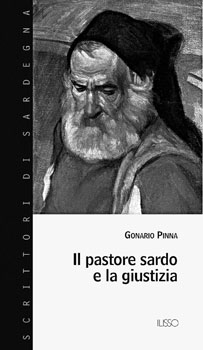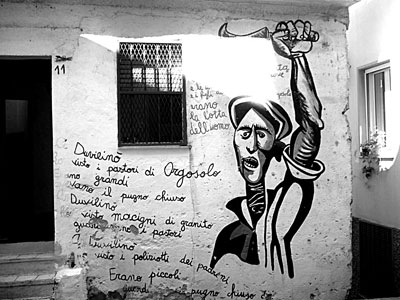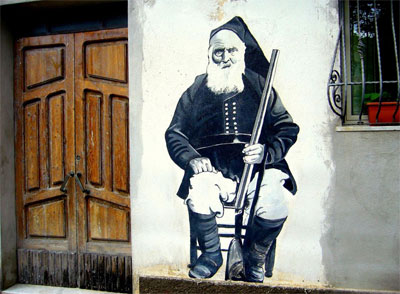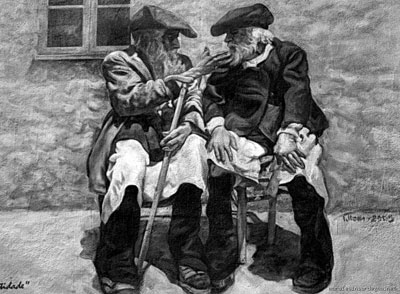
We speak and often invoke, especially in these times, Justice, as if it could get in his white robes and ethereal female to balance the injustice and the two still maintain well the scales. Yet this Justice, which is so neutral that we can trust and convinced of its impartiality and fairness, has not always given rise to these feelings, especially when it came from afar and called itself Justice of the State. It so happened that the people of an island has always been a land of conquest, but also stubborn resistance and came to learn the hard way that deep differences that divided their concept of justice with that taken by the invaders overseas, especially from the nearby Kingdom and then State of Italy.
The Sardinians, in fact, since ancient times, had reserved a sa zustissia an important place in their conception of community, instilling in their own language and in the collective consciousness the idea of justice as recognition of what is consistent with the social balance: mezus manche(t) su pane che sa zustissia, we need more justice than bread. Perceived as a crucial element, therefore, for the very existence of an organized society, a justice, however, that becomes the voice of a community code, the result of time and custom which has writing in his social relations the concept of justice. It was thus that the imposition of a regulatory system brought from outside, and modeled on the concept of justice of the Italian state, inevitably led to a suspicion, first, and then a crash, with that Justice, which was the instrument of a power and doesn’t come from the structure of the community but outside the overlap, the power of the invaders, power of rulers, the power of a State which is not expressed by the original society ... but it has its own characteristics and needs its own tools of empire "(1). These are the words of Gonario Pinna, sardo lawyer who knew thoroughly the barbaric reality of the 50s and above who picked up his long years of contacts with the agro-pastoral world evocating in a book entitled The Sardinian shepherd, and justice: the first symbol the Sardinian community, the second instrument of a foreign power that prevailed, not only through the known repressive systems, but especially and most slyly through a complete emptying of the ancient codes, deeply undermining the concept of living in Sardinia and in contact with the community nature.
 |
Orgosolo (Nu) |
The sense of hiding
And so the justice who plays the policeman and the magistrate on duty, but also of judicial officers, are increasingly associated with the idea of fate, that is something that weighed on the fate of each and which threatened the most important value for Sardinian shepherd, and the ideal condition of life: freedom. Nemos nete de cust’abba non bibo, no one tells you to not drink this water, because no one can tell the safe from the justice and, therefore, no one can be sure to live in freedom. He remained disgrassiau in his braided mesh was considered a victim of a disaster that could strike at all and therefore deserved help from the community. An accident, therefore, not only because the law was not conceived in the abstract but as an expression of power as an instrument and channel of transmission of a certain vision of society. And so that justice of the State began to be considered legitimate because it was not really the result of a natural development of the community adapted and developed its legal system in relation to its needs: it lays the foundation of a deep mistrust of the justice and consequently to the state, against the backdrop of a confrontation between the Community code perceived as natural and therefore respected and feared the state law first, and then finally unrecognized rejected. Two social authorities clashed, one that is rooted in tradition and custom, observed that freely accepted in the eyes of the shepherd, and the expression of a dominant power, compliance with which was imposed from outside.
Matured so the transition from fear aroused by the terrible nature of justice, which took away not only freedom but also the goods, fighting it out through the inaction of the banditry and the forms that led to "open rupture with society, and the declaration of War to the State "(2). The absence, in fact, is the first striking manifestation of the distrust of the Sardinian shepherd in the righteousness of the State, since it focuses on three elements in stark contrast to the morality of their pastor. The first is the classism of justice, namely the belief that "chie hat dinare cumparit innossente" (who has money is innocent) and that the balance, therefore, always hang over the side of who is stronger socially, especially an article of the code of law showed the idea that the State had of justice was the rule for the robbery if you stole three or more head of cattle sheep raised, an aggravating circumstance that in theory was to protect livestock, the backbone of the island economy, but creaked with the huge disproportion between the punishment usually imposed on anyone who stole cattle, often driven by poverty, and that imposed for serious fraud or fraudulent insolvency; two "criminal capacity" very different than those put in place for articulation and social consequences of that poor man who stole three sheep and one of fraud. The theft, in fact, fell somewhat in the normality of communal living, so that through the established practice of "s'abbonamentu" thefts were solved through private arrangements with the return of the livestock or damages. The second element, did give the name of evil to know zustissia and that caused a deep skepticism to a total opposition, were the standards to prevent, because they did not respond to punitive conception, which was followed by a damage repair, but constituted a preventive measure disproportionate to any crime but seeks to strike the supposed dangerousness of the individual. Arbitrariness and error, as was outlined to the minister in the use of these rules and uncertainty fueled, in spite of the security claimed by the State. The last element, however, is intertwined with another institution in Sardinia has been and continues to be a large presence: the prison.
 |
Orgosolo (Nu) |
Disamistade to the State
The opposition to the punitive system of the shepherd was born at the beginning, completely foreign to him, the conversion of fines in prison, a practice, in fact, not only contradicted the concept of the shepherd that the punishment should be proportionate to the case, but above all the moral sensibility of the shepherd irritated because he knew that such a conversion particularly affected "the unfortunate" that can see the work of years to be canceled in a few months. This was the main reason that pushed many to the fugitive, not only option offered by the "right" legal system to monitor the state of their flock and protect it from enemies. The terror that incarceration, especially prior to the shepherd inspired the idea that the scales of justice lay always in favor of power, ie who wrote the laws and forced compliance, led the Sardinian community to look at prisoners as of wretches, whose family was sustained during the period of detention. Not only that, the world gave birth to a beautiful pastoral practice, known as "sa ponidura", which was to reconvene, through the donation of an animal by any pastor, a new flock to donate to the person who came out of prison and that, with most likely, had lost everything after the detention. A flock that becomes sacred in the eyes of the whole community and whose theft was considered sacrilege. It was the materialization not only of community spirit, but above all the opposition to a moral code and social repression and isolation that forced the state opposed the solidarity and the protection of the individual.

Perhaps that's just the story of a distant time and a reality that no longer exists? Partly yes, because those community bonds certainly have been undermined and frayed, and altered the codes robbed of their direct line to the social fabric of which were the result. But perhaps something remains, albeit concealed, and often de-politicized, and it is the sense of alienation than an instrument of state perceived interests opposed to those of a land and its people. What then can this show looking back are the historical roots of an attitude that still bears the Sardinia to be defined as "a sort of modern political laboratory ... a land where we debate and discuss, a place where the 'high level of political culture means that phenomena, often considered on the' mainland 'as mere expressions of popular discontent or category of offenses punishable by law, are assessed and analyzed in a broader perspective, taking into account the island historical and cultural roots. It is a land where extremism try the experiment so far failed 'to the continent', to convey a single bed in the most various 'anti-system' departments in the name of a common goal, which in this case, you identify with 'liberation from Italian rule colonizer' (3): words are written in the journal of the Italian intelligence Gnosis reference in an article in 2005, and aim to keep alive the attention of the State for that high rate of political culture not to come out of the institutional system in accordance with the robbery of the resources of the island. Penalty: the politicization of the social malaise and the Disamistade that tension, toward an enmity that historically has been a symbol of power and repression.